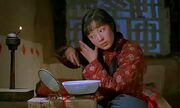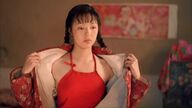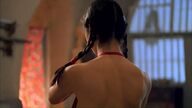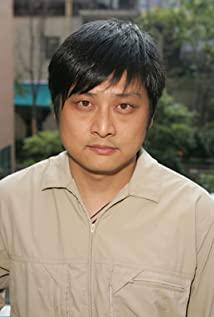The film revolves around Lao Liu Kai's Qingshuichi bathhouse. Lao Liu has been running a bathhouse all his life, and his second son, Erming, is a little mentally handicapped. One day, Daming, who was working hard in Shenzhen, received a postcard from Erming. The letter showed that his father was lying on the bed and Erming was sitting by the bed. When Daming saw it, he hurried back to Beijing for the funeral. In the end, when he returned to his house in Qingshuichi, he found that this was not the case. His father was giving He Bing a good bath, and the letter depicted only his father sleeping. What I thought was going to be a funeral turned out to be an unexpected trip to visit relatives.
The story of the film takes place in the hutongs of Beijing in the 1990s: Hutongs are the representatives of tradition, the old, and those that are about to disappear; while new ideas and new ways of life are constantly emerging from the outside, through He Bing, through Daming These young adults were brought into this Hutong community. The scene where He Bing uses the automatic bathing machine at the beginning of the movie is a stroke of genius. This performance is a bit absurd, in fact it was He Bing's imagination when he was taking a bath in the clear water pool. In real life, he's full of weird business ideas, but he's actually a scumbag who doesn't do his job properly. This opening has a theme, and it also has a huge contrast with the subsequent bathhouse scene, echoing the film's theme of breaking the old and building the new. Under the collision between the old and the new, people find that although the old is destined to die, the old can also embrace the new life, just as Daming finally decides to stay and live with Erming, or Erming sings my sun and The bathhouse is like a final goodbye.
The repeated scenes in the film are very clever. The radio gymnastics broadcast when the bathhouse opened, the towel steaming, and Erming flipping the service card, reminded the audience over and over again the scene of the story. With each repetition, there are subtle changes as the story develops: in the beginning, Lao Liu mopped the floor and Er Ming wiped the table; later when Lao Liu became ill, it became Er Ming mopping the floor and Da Ming cleaning the table; finally Lao Liu left Now, the two brothers were left fighting each other in the empty bathroom. Another recurring one is "My Brother Sun". He is a mentally retarded boy who sings my sun every day in the bathroom while showering; and he can't sing when the water is turned off. In the Hutong demolition art show, the younger brother did not dare to speak out because he was afraid, so Erming picked up the water pipe and threw it on the stage without saying a word. This story is also part of the theme: everyone, even a fool, deserves the right to dream; his or her dreams, even humble and crude, should be accepted and encouraged by society. A fair society should care enough for the disadvantaged and let them have a decent life. I have to say that although "Bath" is not a typical theme movie, it should be said that the three views expressed in it are very positive.
The two flashbacks in the movie are very distinctive and purposeful. The first section took place in northern Shaanxi. Due to the dry climate, people there only take a bath once in a lifetime. When a girl is young, she only takes a shower before getting married, and then she can go on the road. So the girl's father spent all the food in the family in exchange for a basin of bath water. Under the candlelight, the complicated family was preparing the dinner before their daughter's marriage, while the girl behind the curtain shed sad tears in the warm bathtub. The girl in Lao Liu's mouth was his daughter-in-law, Erming's mother. It is worth mentioning that in the scene where the girl was in the bath, the girl's graceful curves and delicate facial features showed all the beauty of oriental women, which was very beautiful. This flashback describes the past as a contrast to the happy life of the present. This memory is an echo of the collective sentiments of the people since the reform and opening up, a memory of the hard days and gratitude for a new life. Another flashback is the story of a Tibetan grandmother and granddaughter looking for a holy lake on the plateau. The people there only take a bath once in a lifetime, and they have to go over mountains and mountains to take a bath in the holy lake. The water of the holy lake can not only wash the body, but also the soul. This story is a story told by Lao Liu and Er Ming. It is a tribute to the pure soul and expresses the expectation of happiness and beauty in the future.
Another attraction of the film is the hutong culture in Beijing. The film is literally a trade fair of Beijing hutong culture. In the bathhouse unique to the north, the big men with naked backs play chess, fight crickets, rub each other's baths, pedicures, and cupping. These cultural interests are detailed and interesting through close-up shots. Here, the use of the camera is similar to that of Lao Zhu cooking the Manchu and Han banquets in "Eating and Drinking Men and Women". In the film, the so-called "tough guy tenderness" of Beijing's big men is expressed through many non-mainline stories. For example, there is a pair of old men fighting crickets, and the two are cricket friends. Later, an uncle accused another uncle of feeding the crickets ant eggs, which is disrespectful to sportsmanship. This paragraph made me laugh out loud. When the hutong was about to be demolished, the two old people sighed that the new community had no bathhouse and no crickets could be raised. The days of happy entertainment would soon be over. Another story is the old brother who was divorced with his wife. Two years ago, his daughter-in-law ran naked from the bathroom to the street to catch thieves. He felt ashamed that the bed couldn't get up. When the old Liu family heard that, in order to cure his "illness", they specially set up a bathing station for this brother and sister-in-law in the bathhouse. If it was so far, people would easily think wrong; but in the background of this story It can be seen how honest and kind people were at that time.
The main line of the film is of course the father-son relationship between Daming and Lao Liu, one is an old man who has been in the bathhouse business for decades, and the other is a wandering child thousands of miles away from home. Daming's father is very old, and many years of management have also caused many diseases; Erming is mentally handicapped, and now his father is still there, he can be regarded as a caregiver; but who knows how Erming can take care of his father when he is old Who will take care of the mentally handicapped Er Ming? It is precisely because of these invisible pressures that Daming has a sad and unhappy face from beginning to end. He wants to have a career of his own and loves the family deeply, but he can't seem to go back. I believe that every wanderer who is thousands of miles away from home can deeply appreciate the kind of deep and not arrogant family: not only looking forward to a rare reunion, but also afraid to talk to the family, for fear of hearing bad news. Fortunately, the movie did not make a fuss about it too much, and the promotion of the father-son relationship only stopped, which made people feel very real and comfortable. It is true that not all love in the world is full of so-called dramatic tension, and most of them are like the father-son relationship between Lao Liu and Daming, like a trickle, whispering in a whisper. After Lao Liu died, Daming's girlfriend couldn't accept the fact that she had to take care of her mentally handicapped younger brother. Daming seems to have seen through the relationship between men and women, but in the face of his father's death and his girlfriend's incomprehension, he is relieved. Daming's calmness and tenderness towards love are basically unheard of in today's impetuous society, which makes me appreciate the three views promoted by "Bath". The day before Qingshui Pool closed, brothers Daming and Erming spent the last time splashing in the bathhouse. In this scene, for the first time, the audience saw a smile on Daming's melancholy face. Those long-suppressed anguish seemed to be burning recklessly in the bathroom in an instant, so happy.
Everything of the old times fell with the clear water pool. It seems that only when the wall is down can there be spring breeze and sunshine. Although the old people passed away, the emotions that permeated the air and the memories weaved in the hutongs have been passed down with the stories of generations.
View more about Shower reviews










